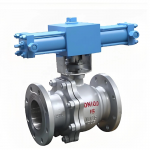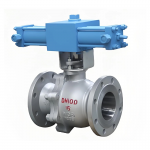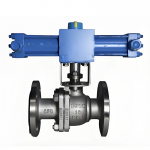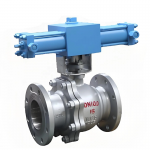Specification
TIANYU DN100 PN16 Flange CF8/WCB Trunnion Mounted Ball Valve With Hydraulic Actuator: Engineered for Precision Flow Control in Industrial Systems
I. Product Overview
II. Key Attribute Specifications
A. Dimensional and Pressure Parameters
- Nominal Diameter: DN100, part of the trunnion – mounted ball valve range (DN50 – DN500 for fixed – ball design). This 2 – inch diameter is optimized for medium – flow industrial pipelines, balancing flow capacity and space efficiency. It ensures smooth media passage while enabling precise control over flow rates, critical for processes like chemical dosing, steam distribution, or oil transfer.
- Connection Type: Flange – type, conforming to industry standards (e.g., ASME B16.5). Flanged connections facilitate secure, leak – tight integration into pipeline systems. The flange design distributes pressure evenly across the joint, enhancing structural stability under PN16 pressure and enabling easy maintenance and replacement.
- Nominal Pressure: PN16 (1.6MPa working pressure), with capabilities to handle system pressures up to this rating. This makes it suitable for a broad spectrum of industrial applications, from low – pressure water supply networks to medium – pressure hydraulic circuits, steam lines, and chemical processing systems.
B. Material Composition
- Valve Body Material) Available in CF8 (stainless steel, equivalent to 304) and WCB (cast carbon steel).
- CF8 Stainless Steel: Offers superior corrosion resistance, attributed to its 18 – 20% chromium and 8 – 10.5% nickel content. This forms a passive oxide layer, protecting against rust, pitting, and chemical attack—ideal for applications involving corrosive media (e.g., acids, alkalis, seawater). It also boasts good mechanical properties (tensile strength ≥ 515MPa), ensuring structural integrity under pressure.
- WCB Cast Carbon Steel: Delivers high strength and durability, with tensile strength ranging from 485 – 655MPa. Suited for non – corrosive or mildly corrosive media (e.g., water, steam, mineral oils), it provides cost – effective performance in industrial systems where corrosion resistance is not the primary concern.
- Sealing Material) Multiple options to suit diverse media and operating conditions:
- PTFE: Exceptional chemical resistance, low friction, and high sealing efficiency. Ideal for clean, non – abrasive media (e.g., water, gases, mild chemicals), ensuring bubble – tight sealing and long – term reliability.
- PPL: High – temperature resistance (up to 300℃), suitable for steam and hot oil applications. Maintains sealing integrity under thermal cycling and provides good wear resistance.
- Metal Hard Seal: Comprises hardened metal surfaces (e.g., stainless steel, alloy coatings) for high – pressure, high – temperature, and abrasive media. Withstands extreme conditions (e.g., high – pressure steam, slurry flow), ensuring durable sealing and minimal leakage.
- Hard Metal Alloy: Offers exceptional wear and corrosion resistance, designed for highly abrasive or corrosive media (e.g., mining slurries, aggressive chemicals). Extends valve service life in harsh environments.
C. Actuation and Operational Parameters
- Control Mode: Dual – action (double – acting) and single – action (spring – return) hydraulic actuation.
- Double – Acting: Utilizes hydraulic pressure for both opening and closing, delivering fast, precise valve operation. Ideal for continuous – process applications requiring rapid flow adjustment or frequent cycling.
- Single – Acting (Spring – Return): Employs hydraulic pressure for one direction (e.g., opening) and a spring for return (closing). Ensures fail – safe operation, reverting to a predefined position (open or closed) during hydraulic pressure loss—critical for safety – critical applications (e.g., emergency shutdown systems).
- Hydraulic Pressure: Operates within a 3.2MPa – 16MPa range. This allows customization to match system hydraulic pressures, ensuring optimal actuator performance and valve control.
- Medium Temperature: ≤ 200℃ (standard), compatible with a wide range of industrial media temperatures. For high – temperature applications (up to 300℃), PPL or metal seals can be specified.
- Ambient Temperature: Standard range of – 20℃ to 80℃, suitable for most industrial environments. Customized designs can extend this range for extreme – temperature applications (e.g., cryogenic or high – heat environments).
III. Feature Description
A. Trunnion – Mounted Ball Design
- Reduces Seat Wear: Distributes media pressure across the ball and seat more evenly, minimizing wear and extending seal life—critical for PN16 pressure and high – cycle applications.
- Enables Higher Pressure Ratings: The trunnion support stabilizes the ball, allowing the valve to handle higher pressures (up to PN16 and beyond for specialized designs) without seat deformation or leakage.
- Improves Sealing Reliability: Ensures consistent ball – to – seat contact, even under fluctuating pressures or flow rates. This results in reliable, bubble – tight sealing (ANSI/FCI Class V or higher), preventing media leakage and ensuring process safety.
B. Hydraulic Actuation Precision
- High Torque Output: Hydraulic actuators generate significant torque, enabling quick and precise valve operation—even for large – diameter or high – pressure valves. This ensures rapid flow adjustment in critical processes (e.g., chemical injection, steam turbine bypass).
- Proportional Control Capability: When paired with a suitable control system, hydraulic actuators support proportional flow control. This allows for fine – tuning of flow rates (e.g., 0 – 100% modulation), essential for processes requiring precise media dosing or pressure regulation (e.g., pharmaceutical manufacturing, oil refining).
- Rapid Response Time: Hydraulic systems react quickly to control signals, enabling fast valve opening/closing times (milliseconds to seconds, depending on design). This is vital for emergency shutdown scenarios, where minimizing media release or equipment damage is critical.
C. Corrosion and Wear Resistance
- CF8 Stainless Steel Durability: In corrosive media (e.g., coastal water treatment, chemical processing), CF8’s passive oxide layer resists rust, pitting, and chemical attack. This extends valve service life and reduces maintenance costs, even in aggressive environments.
- WCB Strength in Non – Corrosive Systems: For non – corrosive media (e.g., steam, mineral oils), WCB’s high tensile strength and impact resistance ensure long – term reliability. Its cost – effectiveness makes it a practical choice for large – scale industrial systems.
- Seal Material Adaptability: The range of seal materials (PTFE, PPL, metal, Hard Metal Alloy) allows matching the valve to specific media characteristics. For example:
- PTFE seals suit clean, low – temperature media (e.g., drinking water, compressed air).
- PPL seals handle high – temperature steam or hot oils.
- Metal and Hard Metal Alloy seals resist abrasion and corrosion in slurry or chemical processing applications.
D. Flange Connection Reliability
- Leak – Tight Integration: Precision – machined flange faces and compatible gaskets (e.g., spiral – wound, metal – jacketed) create a secure seal, preventing media leakage under PN16 pressure.
- Easy Installation and Maintenance: Flanged connections allow straightforward valve installation, removal, and maintenance. This reduces downtime during inspections, repairs, or replacements—critical for continuous – process industries (e.g., petrochemicals, power generation).
- Compatibility with Industrial Standards: Conforming to ASME B16.5 and other industry standards, the flanged valve integrates seamlessly with existing pipeline systems, eliminating the need for custom fittings or modifications.
Product Overview
IV. Manufacturing Processes
A. Valve Body and Ball Fabrication
- CF8 Stainless Steel Processing:
- Casting: Investment casting or sand casting is used to form the valve body and ball. Investment casting ensures high precision and smooth surface finishes, critical for trunnion – mounted valve geometry.
- Heat Treatment: Solution annealing (for CF8) refines the material’s microstructure, enhancing corrosion resistance and mechanical properties.
- Machining: CNC machining centers precision – machine the valve body, ball, trunnions, and flange faces. Tight tolerances (±0.05mm) ensure proper trunnion – to – ball alignment, seat contact, and flange compatibility.
- WCB Cast Carbon Steel Processing:
- Casting: Sand casting or die casting produces the valve body, with post – casting heat treatment (e.g., normalizing, tempering) to relieve internal stresses and improve mechanical properties.
- Machining: Similar to CF8, CNC machining ensures dimensional accuracy and surface finish, critical for sealing and trunnion support.
B. Trunnion and Seat Assembly
- Trunnion Installation: Trunnions (stainless steel or alloy) are precision – fitted to the ball and valve body. Bearing surfaces are lubricated (e.g., with anti – friction coatings or grease) to ensure smooth ball rotation and reduce wear.
- Seat Installation: Seals (PTFE, PPL, metal, etc.) are installed into the valve body. For metal seals, precision lapping or grinding ensures a uniform, leak – tight seal between the ball and seat. PTFE and PPL seals are compression – fitted or mechanically retained to prevent displacement under pressure.
C. Hydraulic Actuator Integration
- Actuator Manufacturing: Hydraulic actuators are engineered to match the valve’s torque requirements. Cylinders, pistons, springs (for single – acting), and control components are precision – machined and assembled.
- Calibration and Testing: Actuators are calibrated to ensure accurate valve positioning (e.g., 0 – 90° rotation for ball valves). Hydraulic pressure testing verifies leak – free operation and torque output.
- Integration with Valve: The actuator is mounted to the valve via a suitable adapter (e.g., ISO 5211 mounting interface). Linkage components (e.g., yokes, stems) are adjusted to ensure smooth, precise valve operation.
D. Quality Testing and Certification
- Hydrostatic Pressure Testing: The assembled valve is pressurized to 1.5×PN16 (2.4MPa) with water or an inert fluid. Leakage, deformation, or structural failure is checked over a 30 – minute test period.
- Seal Integrity Testing: Air or gas pressure testing (at 1.1×PN16) verifies seal leakage rates (e.g., ANSI/FCI Class V for PTFE seals).
- Actuator Performance Testing: Hydraulic actuators are tested for response time, torque output, and fail – safe operation (for single – acting designs).
- Certification: Valves meet industry standards (e.g., API 6D, ASME B16.34) and may be certified for specific applications (e.g., fire – safe, low – emission).
Valve Details
V. Product Advantages
A. High – Pressure Reliability
B. Precise Flow Control
C. Corrosion and Wear Resistance
D. Safety and Fail – Safe Operation
E. Easy Integration and Maintenance
Application
VI. Product Applications
A. Oil and Gas Industry
- Upstream Production: Controls flow of crude oil, natural gas, and produced water in wellheads and gathering systems. Trunnion – mounted design handles high pressures; CF8 material resists corrosion in saltwater environments.
- Midstream Transmission: Regulates flow in pipelines transporting refined products (e.g., gasoline, diesel). Hydraulic actuation enables rapid shut – off during emergencies, preventing spills and ensuring pipeline integrity.
- Downstream Refining: Manages flow of process fluids (e.g., chemicals, steam) in refineries. Precise hydraulic control supports accurate blending and process optimization.
B. Power Generation
- Steam Turbine Bypass Systems: Controls steam flow during startup, shutdown, or load changes. Trunnion – mounted design and PPL seals handle high – temperature steam (≤ 200℃), ensuring reliable operation.
- Cooling Water Circuits: Regulates flow of cooling water in power plants. WCB material provides cost – effective performance in non – corrosive water systems; hydraulic actuation enables remote control for efficiency.
- Boiler Feedwater Systems: Manages flow of high – pressure feedwater to boilers. CF8 material resists corrosion from oxygenated water; trunnion – mounted design ensures leak – tight sealing.
C. Chemical Processing
- Acid and Alkali Handling: Controls flow of corrosive chemicals (e.g., nitric acid, caustic soda). CF8 material and PTFE/metal seals ensure corrosion resistance and reliable sealing.
- Chemical Reactor Feed: Precise hydraulic control regulates media flow into reactors, ensuring accurate chemical dosing and process efficiency.
- Wastewater Treatment: Manages flow of contaminated water in treatment plants. WCB or CF8 material (with appropriate seals) resists corrosion from chemicals and solids.
D. Water and Wastewater Treatment
- Drinking Water Supply: Controls flow in municipal water networks. CF8 material ensures corrosion resistance; flanged connections enable easy maintenance.
- Industrial Water Treatment: Regulates flow of treated water in industrial facilities. Hydraulic actuation supports remote control and automation for efficiency.
- Sludge and Wastewater Handling: Manages flow of abrasive slurries. WCB material (with metal or Hard Metal Alloy seals) resists wear and corrosion.
E. Manufacturing and Process Industries
- Pharmaceutical Manufacturing: Precise flow control of high – purity media (e.g., solvents, APIs). CF8 material and PTFE seals ensure product quality and compliance with hygiene standards.
- Food and Beverage Production: Regulates flow of ingredients and cleaning agents. CF8 material (FDA – compliant) and PTFE seals ensure hygiene and corrosion resistance.
- Automotive and Machinery: Controls flow of hydraulic fluids in manufacturing equipment. WCB material and hydraulic actuation enable reliable, high – pressure operation.
RELATED
-

High Temperature/Pressure 304 Stainless Steel Resistant Manual Power Forged Three Piece Flanged Floating Ball Valve
TIANYU 304 Stainless Steel Flanged Floating Ball Valve: Corrosion-Resistant Full-Port Flow Control Solution for Industrial, Sanitary, and Municipal Me…
BALL VALVE 11/03/2025 -

API ANSI 2in-16in DN50-DN400 PN10 PN16 CF8M Pneumatic Flanged Floating Ball Valve
TIANYU CF8M Pneumatic Flanged Floating Ball Valve: 2in-16in (DN50-DN400) PN10-PN16 API/ANSI Class Corrosion-Resistant Flow Control Solution for Indust…
BALL VALVE 11/01/2025 -

Large-Diameter DN1400 CLASS150 WCB SS Triple Eccentric Metal-Sealed Hard Seal Butterfly Valve
TIANYU DN1400 (56″) CLASS 150 WCB Hard Seal Butterfly Valve: Triple Eccentric Metal-Sealed Flanged Valve for Large-Diameter Industrial Media wit…
BUTTERFLY VALVE 10/30/2025 -

PN16 Stainless Steel Floating Ball Valve: Full Port 2PC Flange-Connected Valve with Fire-Safe & Anti-Static SS Ball Valve
TIANYU Stainless Steel Floating Ball Valve: Full Port 2PC Flange-Connected Valve with Fire-Safe & Anti-Static Design for Oil, Gas, and Industrial …
BALL VALVE 10/29/2025 -

High-Performance DN80 Class 150 WCB Soft-Sealed Lug-Type Double Eccentric Butterfly Valve
TIANYU 3” Class 150 WCB lug-type double eccentric butterfly valve is a technologically advanced flow control device engineered to address the challeng…
BUTTERFLY VALVE 10/25/2025 -

DN125 PN16 CF8M Stainless Steel Lug-Type Butterfly Valve with PTFE Lining Concentric Line Butterfly Valves
TIANYU DN125 PN16 CF8M stainless steel lug-type butterfly valve is a precision-engineered flow control device designed to address the challenges of ha…
BUTTERFLY VALVE 10/25/2025






